I’m Not ‘Lazy,’ I’m Sick
Written by |

One of the hardest parts of having chronic health problems is the guilt. Many people struggling with complex conditions are branded “lazy.” And sometimes we even brand ourselves.
Before I was diagnosed I was always exhausted, had very little energy, and would often take naps in the afternoon. When I was told I had pulmonary hypertension, while swirling in fear and grief … I felt a small pang of relief. I wasn’t a lazy, incompetent person — I was sick. It felt like a piece of the puzzle had fallen into place.
Even now, post diagnosis, the fact that my illness is invisible means that people often forget what I am contending with. Sometimes even I forget. I have written in previous columns about how problematic this can be in the workplace, but it’s also an issue in the home.
Sometimes I feel guilty that my family, with whom I currently live, sometimes ends up doing more housework than me. I worry that I am not pulling my weight. But at the same time, I have been struggling with significant side effects from a new medication. This includes joint pain that makes simple tasks, such as washing-up, challenging and painful. It’s all too tempting to let others take up the slack when it costs them nothing but would exhaust me.
On the other hand, I know it’s important to push myself to do things whenever I can, to make the most of it when I DO have the energy. Any spoonie knows the sense of pressure to get everything done if they are having a good day. You never know how you might feel tomorrow.
I’ve found there are also ways you can make housework more manageable. For washing up and cooking, I pull up a stall so I don’t get sore from standing. For laundry, I try and do smaller loads so that carrying it and hanging it out to dry is easier. For cleaning, I make sure to split up the tasks and take breaks so I don’t get overwhelmed. Also, whatever housework I’m doing, I tend to pop on a podcast and not rush myself. So what if it takes me longer than other people? Pacing myself means I’m able to continue doing these things.
As with most things, it is all about balance. I am learning to accept help when I truly need it and be as independent as I can when I feel able.
It’s also important to communicate. Nine times out of 10, if you ask for help and express that you are struggling with a lack of energy that day, your loved ones will be more than happy to help.
Ultimately, I have to remember that chronic fatigue is unfortunately a big part of my illness. And while I might look like everyone else, my heart is working twice as hard!
***
Note: Pulmonary Hypertension News is strictly a news and information website about the disease. It does not provide medical advice, diagnosis, or treatment. This content is not intended to be a substitute for professional medical advice, diagnosis, or treatment. Always seek the advice of your physician or other qualified health provider with any questions you may have regarding a medical condition. Never disregard professional medical advice or delay in seeking it because of something you have read on this website. The opinions expressed in this column are not those of Pulmonary Hypertension News or its parent company, Bionews Services, and are intended to spark discussion about issues pertaining to pulmonary hypertension.




SHERRI Cole
Love this article. So many PAH patients need to embrace this perspective. It is such an important issue. I had branded myself as unmotivated and lazy in the year before my diagnosis. After the diagnosis, I felt extremely justified in slowing down and needing an occasional nap. In fact, I went to bed the day after my diagnosis and slept all day! A year later my symptoms are much improved and as you said, I have really good days, and the next, not so much. I look healthy enough and have been branded by some co-workers as receiving special treatment (unable to do the three flights of stairs in my workplace). I was even cussed out by a patron who thought I did not look disabled enough to use the motorized scooter at my local grocery store in spite of the infusion pump and 10 lb bag of meds I was toting around. It can be tough, but I am grateful for every breath I take and will do whatever is necessary for my health in spite of occasional criticism. The support of close family and friends can make up for a lot of the negative branding by uninvolved onlookers. Regardless of anyone's negative chatter, I am responsible for maintaining my body for optimal health and I am committed to doing so without regret.